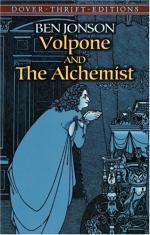|
This section contains 268 words (approx. 1 page at 400 words per page) |

|
Ben Jonson's The Alchemist, written in 1610, is another play that uses the farce or the con game as a plot device. In this case, a servant takes advantage of his master's absence to swindle a succession of people with the promise of turning base metals to gold.
Geoffrey Chaucer's "The Miller's Tale" is another parable about greed. As he did elsewhere in his Canterbury Tales, written c. 1387, Chaucer uses an old man's greed and lust to reveal people's vulnerability.
Twelfth Night, by William Shakespeare, was first presented in 1600. Although the plot is not about a swindle, it does involve the use of disguise and trickery to bring about order and resolution. Since Shakespeare was a contemporary of Jonson's, his comedies provide a useful contrast to Jonson's.
The Merchant of Venice, also by Shakespeare, was first presented in 1596. This play likewise...
|
This section contains 268 words (approx. 1 page at 400 words per page) |

|




